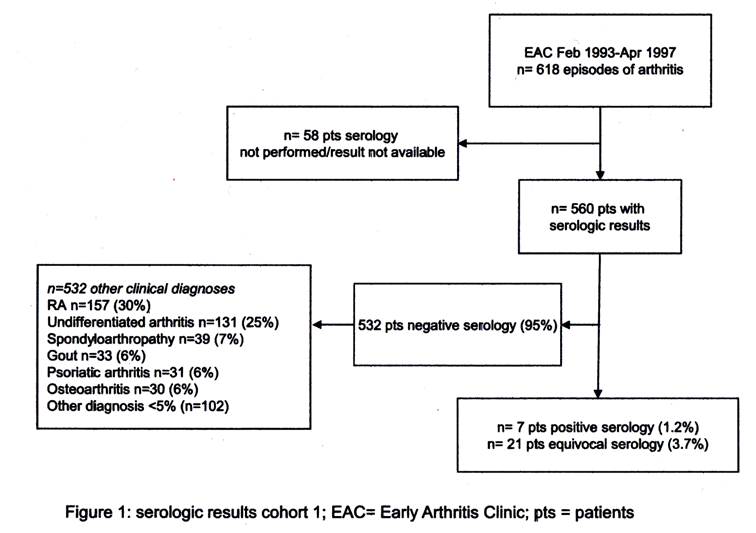Session Information
Session Type: Abstract Submissions (ACR)
Lyme arthritis is a relatively uncommon form of arthritis that is relevant to identify because it requires specific therapy. The presents study aimed to describe 1. the seroprevalence of Lyme antibodies, 2. the prevalence of Lyme arthritis, and 3. the diagnostics accuracy of serologic testing for Borreliae among patients with recent-onset arthritis in The Netherlands. Methods:
The present study included all patients who presented to the Leiden Early Arthritis Clinic during the period of February 1993 to April 1997 (cohort 1) and the period July 2003 to June 2008 (cohort 2). In sera from cohort 1, antibodies against Borreliae were detected by the IgG and IgM flagellin-Enzyme Immune Assay (EIA). All available positive samples were retested with the IgG/IgM C6 EIA. In cohort 2, the C6 Lyme EIA Kit was used. All positive EIA results from both cohorts were confirmed by the Borrelia Europe LINE blot and a second EIA, the Liaison® Borrelia burgdorferi IgG (VlsE) and IgM (VlsE+OspC). The clinical records of the patients with positive or equivocal serology were thoroughly studied; Lyme disease was not diagnosed in case of a clear alternative diagnosis. The proportion of patients with Lyme arthritis was determined, as well as the diagnostic accuracy of Borrelia serology. Results:
Of 1180 patients with recent-onset arthritis, 53 patients had positive serology, indicating a seroprevalence of 4,5% (Figure 1 and 2). Eight cases of definite Lyme arthritis (0.7%) were identified These patients were characterized by younger age, and typically presented with monoarthritis or oligoarthritis including a knee. Retrospectively, possible Lyme arthritis was diagnosed in seven (0,6%) patients. In the remaining patients with positive or equivocal serology different clinical diagnoses were made (rheumatoid arthritis n= 14; spondylarthritis n= 11; systemic inflammatory disease n= 3; osteoarthritis n= 2; other n=8). Based on the low prevalence of Lyme arthritis, the positive predictive value of serology for Lyme disease was low (10-28%). By selecting patients with a higher prior chance of Lyme disease, eg in patients presenting with an oligo- or monoarthritis of large joints, the positive predictive value increased to 67%. Conclusion:
The prevalence of Lyme arthritis among patients with recent-onset arthritis in The Netherlands is low, 0.7%. Although sensitivity and specificity of Lyme serology are reported to be good, serologic testing for Lyme arthritis contributes poorly to clinical decision making in patient with recent-onset arthritis due to the low a priori chance on Lyme arthritis.
Disclosure:
J. K. De Vries-Bouwstra,
None;
N. D. van Burgel,
None;
T. Vreeswijk,
None;
A. C. M. Kroes,
None;
T. W. J. Huizinga,
None;
A. H. M. van der Helm- van Mil,
None.
« Back to 2013 ACR/ARHP Annual Meeting
ACR Meeting Abstracts - https://acrabstracts.org/abstract/prevalence-and-clinical-presentation-of-lyme-arthritis-in-a-large-cohort-of-patients-with-recent-onset-arthritis/


